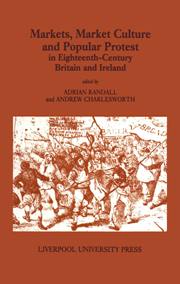Book contents
- Frontmatter
- Contents
- Contributors
- Preface
- 1 Markets, Market Culture and Popular Protest in Eighteenth-Century Britain and Ireland
- 2 Popular Protest and the Persistence of Customary Corn Measures: Resistance to the Winchester Bushel in the English West
- 3 The Jack-a-Lent Riots and Opposition to Turnpikes in the Bristol Region in 1749
- 4 The Cider Tax, Popular Symbolism and Opposition in Mid-Hanoverian England
- 5 Scarcity and the Civic Tradition: Market Management in Bristol, 1709–1815
- 6 The Moral Economy of the English Middling Sort in the Eighteenth Century: the Case of Norwich in 1766 and 1767
- 7 Oxford Food Riots: a Community and its Markets
- 8 The Irish Famine of 1799–1801: Market Culture, Moral Economies and Social Protest
- Index
1 - Markets, Market Culture and Popular Protest in Eighteenth-Century Britain and Ireland
- Frontmatter
- Contents
- Contributors
- Preface
- 1 Markets, Market Culture and Popular Protest in Eighteenth-Century Britain and Ireland
- 2 Popular Protest and the Persistence of Customary Corn Measures: Resistance to the Winchester Bushel in the English West
- 3 The Jack-a-Lent Riots and Opposition to Turnpikes in the Bristol Region in 1749
- 4 The Cider Tax, Popular Symbolism and Opposition in Mid-Hanoverian England
- 5 Scarcity and the Civic Tradition: Market Management in Bristol, 1709–1815
- 6 The Moral Economy of the English Middling Sort in the Eighteenth Century: the Case of Norwich in 1766 and 1767
- 7 Oxford Food Riots: a Community and its Markets
- 8 The Irish Famine of 1799–1801: Market Culture, Moral Economies and Social Protest
- Index
Summary
INTRODUCTION
Markets of one form or another have occupied a key place in the social, economic and political cultures of all peoples throughout recorded history. Exchange seems to have been known since the late stone age and marketing principles feature in the earliest documents of civilization. Market institutions such as regular fairs and markets have an unbroken continuity stretching back to the middle ages. When Adam Smith wrote The Wealth of Nations in 1776, commerce had become so ubiquitous that he saw ‘the propensity to truck, barter, and exchange one thing for another’ as an elementary psychological trait of the human race.
The writings of Smith, however, did more than just focus attention upon market institutions and market principles. The Classical Economists elevated ‘the Market’ to totemic status. It alone was the agency by which all in society could advance their material condition, provided that their natural inclination to exchange was unhindered by regulation or restriction. As Smith wrote:
The natural effort of every individual to better his own condition, when suffered to exert itself with freedom and security, is so powerful a principle, that it is alone, and without any assistance, not only capable of carrying on the society to wealth and prosperity, but of surmounting a hundred impertinent obstructions with which the folly of human laws too often encumbers its operations.
From the late eighteenth century onwards, faith in ‘the Market’, a belief that the self-regulating market functioned at all times in a natural and benevolent manner whenever permitted the liberty so to do, became a kind of secular orthodoxy, ‘Political Economy’.
- Type
- Chapter
- Information
- Publisher: Liverpool University PressPrint publication year: 1996



